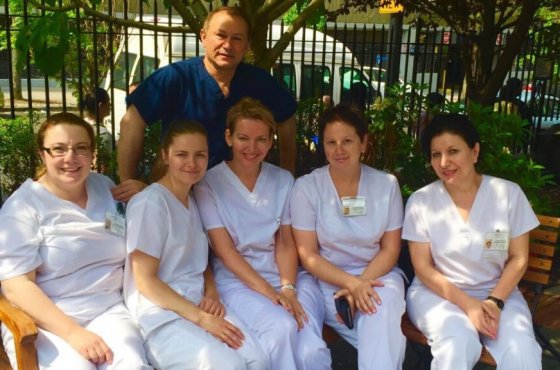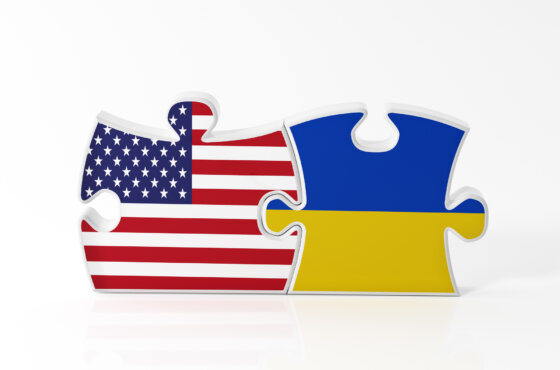Victims of genocide remembered in Armenia
A memorial ceremony is held in Armenia on the occasion of the centenary of the beginning of the massacres of Armenians by Ottoman Turks.
Russian President Vladimir Putin is also participating in it, saying that Russophobic and anti-Semitic sentiments are growing in the world.
Memorial events are held at the memorial to the dead on the outskirts of Yerevan, where everyone can lay flowers.
Armenia claims that one and a half million people died as a result of the killings, but the Turkish authorities disagree with this figure.
The ceremony took place at the Tsitsernakaberd memorial complex and was attended by French President Francois Hollande, the head of Cyprus Nikos Anastasiades and Serbian President Tomislav Nikolic.
Armenian President Serzh Sargsyan said during the ceremony that the “uncompromising international fight against genocides” will become an integral part of the country’s foreign policy.
“The Armenian people will now always stand next to those who suffered from crimes committed against humanity,” he added.
Dispute about terms
Turkey actively objects to the use of the term "genocide" to describe the killings, and the issue has remained a sticking point in relations between the two countries for many years.
The Turkish authorities recognize the fact of the massacres, but claim that there were no systematic attempts to destroy the Christian Armenian community.
In addition, Turkey claims that many innocent Muslim Turks also died in the chaos of the First World War.
A memorial service will also be held in Turkey to honor the victims of the massacre. Prime Minister Ahmet Davutoglu said the country would “share the pain” with the Armenians, but reiterated that he did not consider the incident to be genocide.
On Friday, Turkey also hosts celebrations to mark the centenary of the Battle of Gallipoli.
In fact, the battle began on April 25, and this gave rise to the Armenian President Serzh Sargsyan to accuse Turkey of trying to divert the world's attention from the ceremony in Yerevan.
Friday marks exactly one hundred years since the day when the authorities of the Ottoman Empire arrested more than 200 leaders of the Armenian community in the capital Constantinople. Most of them were subsequently killed.
Thus began the campaign of brutal repression, deportations and massacres, which resulted in the death of more than a half million Turkish Armenians.
BBC correspondent Rayhon Demitrie in Yerevan explains that Armenians view this date as the beginning of a campaign of brutal repression, deportations and massacres organized by the Ottoman government of Christian Armenians who were suspected of supporting Russia, the enemy of the Ottoman Empire in the First World War.
On Friday, Russian President Vladimir Putin and French leader Francois Hollande attended a memorial ceremony.
"The growth of Russophobia"
President Putin, speaking in Yerevan, said that Russophobic and anti-Semitic sentiments are growing in the world.
“Unfortunately, now in many regions of the world neo-fascism is again raising its head, and radical nationalists are striving for power. Anti-Semitism is also gaining strength, and we also see manifestations of Russophobia. One has to wonder why this happens and what is causing it? - Putin said. “When taking any action in critical regions of the world, you must first think about what will happen next, think about the consequences.”
Putin said Russia “sincerely sympathizes with the Armenian people, who have experienced one of the most terrible tragedies in the history of mankind.” According to him, the massacres of Armenians were perceived in Russia “as their own grief.”
Obama's words
The US president issued a cautious statement describing the killings as "one of the worst atrocities of the 20th century" but did not use the term "genocide".
During the 2008 presidential campaign, Obama promised to "recognize the Armenian genocide," and in his new statement he says, "I have repeatedly stated my personal position on what happened in 1915, and my position has not changed."
Nevertheless, the statement outraged the Americans of Armenian descent.
Brian Ardouny, head of the Armenian Assembly of America, said President Obama's "linguistic gymnastics" about the Armenian genocide was unbecoming of a world leader.
Canonization
Yesterday, the Armenian Church canonized one and a half million people—that’s how many, according to its data, died in the massacres and deportations. Church representatives said they want to proclaim as martyrs those who died for their faith and homeland.
After the ceremony, bells rang in Armenian churches around the world.
On Thursday, on the eve of the debate in the German parliament on this issue, German President Joachim Gauck called the killings a genocide.
Most recently, Turkey recalled its ambassador from the Vatican after Pope Francis also described the massacres of Armenians as genocide.
France has long advocated the recognition of massacres as genocide, and President Hollande actively supported a law punishing denial of genocide. As a result, the law was repealed, but tensions still reign in Turkish-French relations.
Subscribe to ForumDaily on Google News










